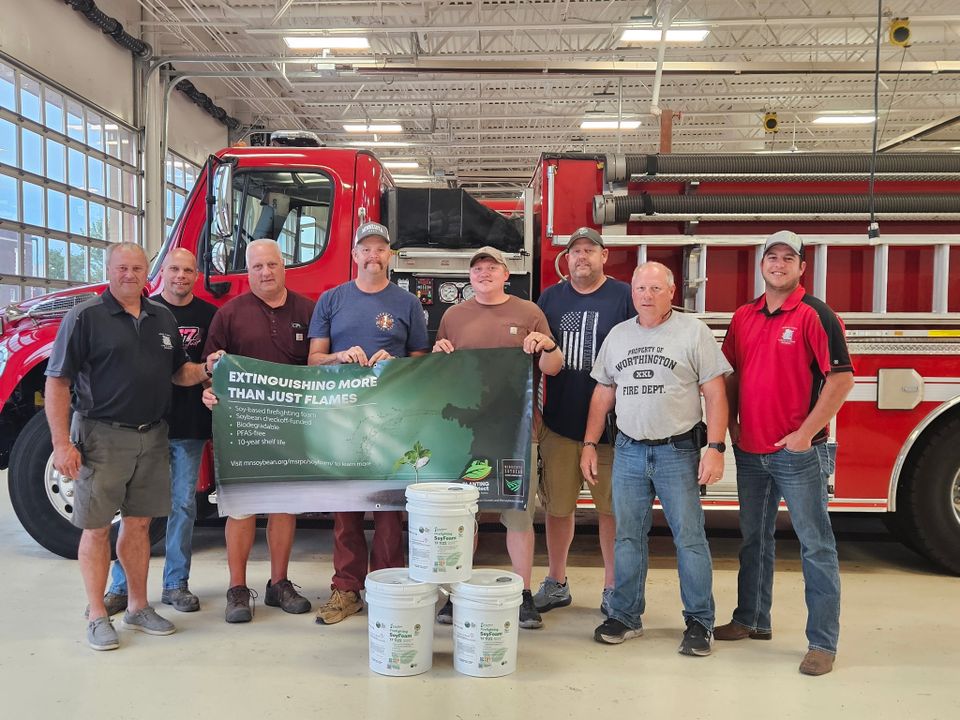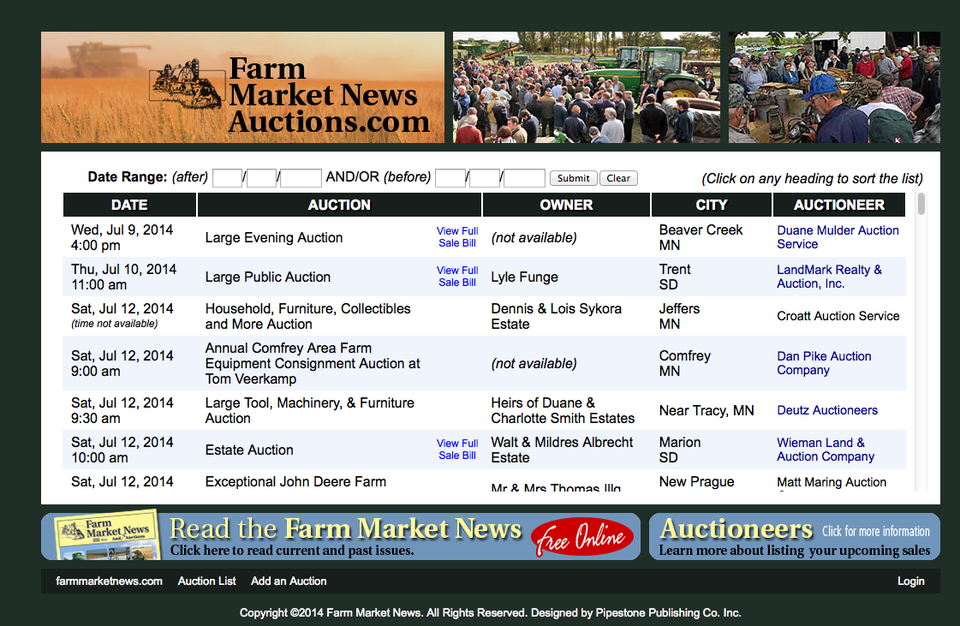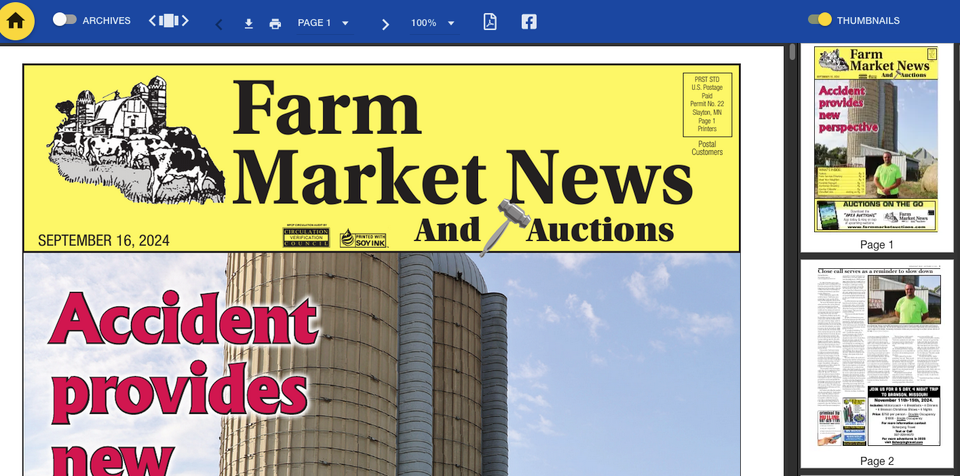Producers donate soy-based firefighting foam to area departments

Fire departments across south-central Minnesota have a new extremely effective — and environmentally-friendly — tool in their toolboxes thanks to local and area soybean producers.
Producer groups from Jackson County, Martin County and Nobles County recently donated pails of SoyFoam to fire departments in their counties.
The Jackson County Corn and Soybean Growers donated SoyFoam to fire departments in Alpha, Heron Lake, Jackson, Lakefield and Okabena. The Martin County Corn and Soybean Growers donated SoyFoam to fire departments in Fairmont, Truman and Welcome. And the Nobles County Corn and Soybean Growers donated SoyFoam pails to fire departments in Adrian, Bigelow, Brewster, Ellsworth, Lismore, Round Lake, Rushmore, Wilmont and Worthington.
Made with soy flour, SoyFoam is the first and only Greenscreen Certified Gold fire foam with zero intentionally added per- and polyfluoroalkyl, or forever, chemicals.
“We are proud to be able to donate the SoyFoam product to the fire departments in our community,” said Albert Henning, treasurer of the Jackson County Corn and Soybean Growers Board of Directors. “The departments were very appreciative of the product not only because of the safety of the product for the environment, but for the health of the firefighters as well. These donations help support our local firefighters with safer, more effective tools and promote a new use for soybeans.”
Jacob Sukalski, treasurer of the Martin County Corn and Soybean Growers Board of Directors, agreed.
“The departments were happy to receive the donation and excited to give it a try since it would work with their equipment,” Sukalski said.
Matt Widboom, chair of the Nobles County Corn and Soybean Growers, said his group was happy to be able to give back to local firefighters.
“This is a wonderful contribution to our county fire departments,” Widboom said, “and we appreciate these volunteers that keep our communities safe.”
The donations were made possible by the farmer-led Minnesota Soybean Research and Promotion Council, which last spring launched the soy checkoff-supported SoyFoam campaign, “Planting to Protect: From Farm to Flame,” in conjunction with Cross Plains Solutions, the developer of Soy-Foam, which has partnered with the soy checkoff to continue testing and promoting the product as a safer alternative to traditional firefighting foam. Through the campaign, the council is offering more than 40 organized soybean counties in Minnesota the opportunity to donate SoyFoam to area fire departments.
“For our soybean farmers, your checkoff investment is helping out the environment and the firefighters who use it,” said council director and past chair Tom Frisch, who has served on the Dumont Fire Department since 2000. “It’s a checkoff investment that is coming to fruition and helping build demand. For our firefighters — rural, city or anywhere in Minnesota — providing a PFAS-free alternative is our goal. For the public in general, homegrown, renewable products benefit all of us.”
SoyFoam is compatible with existing foam inductors and aerating nozzles and is comparable in cost to traditional firefighting foam. With a shelf life of 10 years, SoyFoam can be frozen, heated and thawed and will still be fully functional. It’s also projected to increase demand by using protein from 12 million bushels of U.S. soy.
The Jackson County Corn and Soybean Growers, Martin County Corn and Soybean Growers and Nobles County Corn and Soybean Growers are affiliated with the Minnesota Soybean Research and Promotion Council, a 15-person, farmer-led board that oversees the investment of checkoff dollars on behalf of the state’s nearly 26,000 soybean farmers. The council is governed by the rules of a federally mandated checkoff program requiring all soybean producers to pay a fee on the soybeans they sell. This money is used to promote, educate and develop market opportunities for soybeans.
Producer groups from Jackson County, Martin County and Nobles County recently donated pails of SoyFoam to fire departments in their counties.
The Jackson County Corn and Soybean Growers donated SoyFoam to fire departments in Alpha, Heron Lake, Jackson, Lakefield and Okabena. The Martin County Corn and Soybean Growers donated SoyFoam to fire departments in Fairmont, Truman and Welcome. And the Nobles County Corn and Soybean Growers donated SoyFoam pails to fire departments in Adrian, Bigelow, Brewster, Ellsworth, Lismore, Round Lake, Rushmore, Wilmont and Worthington.
Made with soy flour, SoyFoam is the first and only Greenscreen Certified Gold fire foam with zero intentionally added per- and polyfluoroalkyl, or forever, chemicals.
“We are proud to be able to donate the SoyFoam product to the fire departments in our community,” said Albert Henning, treasurer of the Jackson County Corn and Soybean Growers Board of Directors. “The departments were very appreciative of the product not only because of the safety of the product for the environment, but for the health of the firefighters as well. These donations help support our local firefighters with safer, more effective tools and promote a new use for soybeans.”
Jacob Sukalski, treasurer of the Martin County Corn and Soybean Growers Board of Directors, agreed.
“The departments were happy to receive the donation and excited to give it a try since it would work with their equipment,” Sukalski said.
Matt Widboom, chair of the Nobles County Corn and Soybean Growers, said his group was happy to be able to give back to local firefighters.
“This is a wonderful contribution to our county fire departments,” Widboom said, “and we appreciate these volunteers that keep our communities safe.”
The donations were made possible by the farmer-led Minnesota Soybean Research and Promotion Council, which last spring launched the soy checkoff-supported SoyFoam campaign, “Planting to Protect: From Farm to Flame,” in conjunction with Cross Plains Solutions, the developer of Soy-Foam, which has partnered with the soy checkoff to continue testing and promoting the product as a safer alternative to traditional firefighting foam. Through the campaign, the council is offering more than 40 organized soybean counties in Minnesota the opportunity to donate SoyFoam to area fire departments.
“For our soybean farmers, your checkoff investment is helping out the environment and the firefighters who use it,” said council director and past chair Tom Frisch, who has served on the Dumont Fire Department since 2000. “It’s a checkoff investment that is coming to fruition and helping build demand. For our firefighters — rural, city or anywhere in Minnesota — providing a PFAS-free alternative is our goal. For the public in general, homegrown, renewable products benefit all of us.”
SoyFoam is compatible with existing foam inductors and aerating nozzles and is comparable in cost to traditional firefighting foam. With a shelf life of 10 years, SoyFoam can be frozen, heated and thawed and will still be fully functional. It’s also projected to increase demand by using protein from 12 million bushels of U.S. soy.
The Jackson County Corn and Soybean Growers, Martin County Corn and Soybean Growers and Nobles County Corn and Soybean Growers are affiliated with the Minnesota Soybean Research and Promotion Council, a 15-person, farmer-led board that oversees the investment of checkoff dollars on behalf of the state’s nearly 26,000 soybean farmers. The council is governed by the rules of a federally mandated checkoff program requiring all soybean producers to pay a fee on the soybeans they sell. This money is used to promote, educate and develop market opportunities for soybeans.


